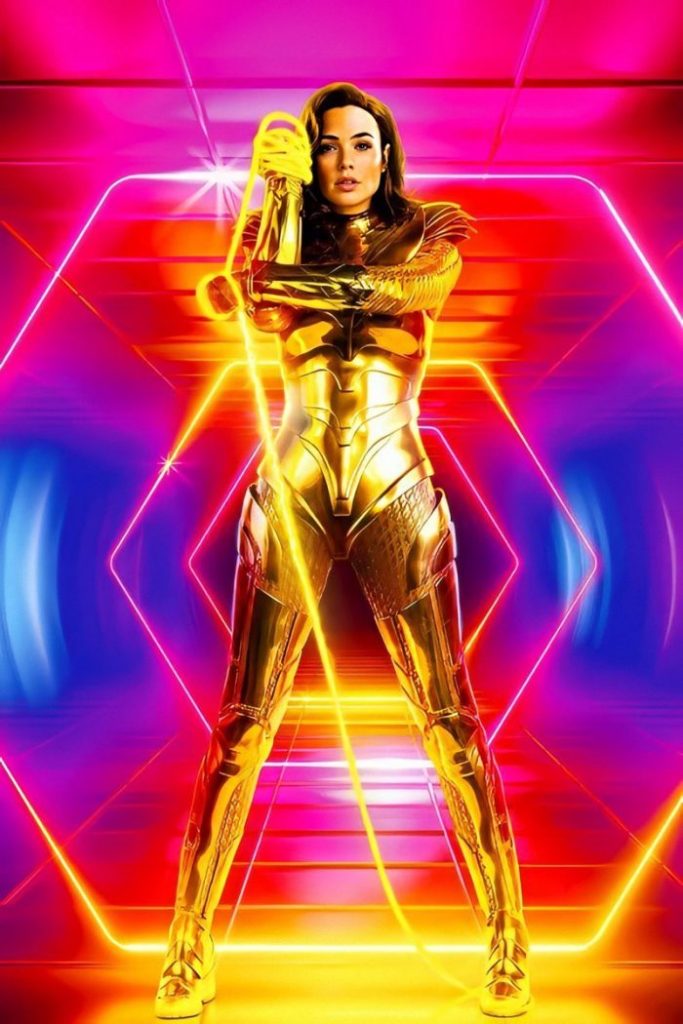
Wonder Woman 1984 is not a great movie. It is merely a good movie that doesn’t measure up to its predecessor. It is bloated, doesn’t effectively utilize the nostalgia that the title promises, and has an unsatisfying conclusion in a disappointing third act.
With a runtime clocking in at a staggering 155 minutes, the movie would have been better served with at least 30 of those left on the cutting room floor. This could have also aided in the cumbersome third act if the creative team would’ve heeded a lesson learned from 80s’ excess, that more isn’t always better.
The film superficially plays with some of the decade’s tropes, mainly break dancing, a president who resembles Reagan, and questionable fashion choices. Still, it might have been better served by paying homage and leaning into the pop culture aspects of its titular year. Despite New Order’s ‘Blue Monday’ featuring prominently in advertising, only one recognizable tune is played during the film, “Welcome to the Pleasuredome’ by Frankie Goes to Hollywood. Take these very few touchstones away, and the film could’ve been set in almost any era.
However, the film is well-acted. Gal Gadot once again proves she was the perfect choice for Diana, and Kristen Wiig provides depth and nuance to Barbara Minerva, making her second act turn even more tragic. Pedro Pascal stands out as Max Lord. He devolves from a sympathetic dad/con man trying to make a better life for himself and his son to a scene-chewing, power-hungry villain. The reliable Chris Pine also returns as the charismatic Steve Trevor.
Patty Jenkins’ direction is flawless. She excels with the action set pieces and displays a deft touch with both the emotional scenes as well as the comedic ones. The message at the core of the story is a timely one, and it’s that truth is what matters. Taking shortcuts to achieve what you desire and ignoring the truth only leads to self-deception and pain. Doing what is right is the most important thing, no matter what losses you suffer or what you must sacrifice. You can’t always get what you wish for.
These are my opinions on why Wonder Woman 1984 is worth seeing and what I feel are valid criticisms on why the film doesn’t live up to the promise of the first one. What I’m really here to do, is to explain in detail why some of the criticisms levied against the film I’ve read aren’t justified. To do that, I’ll have to delve into spoiler territory. If you haven’t seen the movie, stop reading now and come back after you’ve watched it.

Racist, misogynistic, and condones rape. All three of those accusations have been used to denounce WW84. I am a cis, straight, white male, so maybe in today’s climate, I don’t have the right to explain why this movie isn’t any of the things it has been accused of, but I’m going to. I’m going to because I like to think of myself as aware or ‘woke’ enough to notice those things when I see them. And in this case, I don’t.
It’s been labeled racist primarily due to the portrayal of Emir Said Bin Abydos (played by Amr Waked), a landowner and oil magnate in Cairo that Max Lord grants a wish to so he can seize his crude. Abydos desires for the land returned to his “rightful” ownership, and the ‘heathens’ occupying it expelled.
Critics say that this is just another example of otherizing MENA (Middle Eastern and North Africa) people and exploiting stereotypes. They also point out that they didn’t even get the clothes, titles, or politics of the region right. Never mind that this is one man’s wish, and we see the people of Cairo immediately start to suffer because of his ill-intentions. There are evil men of every race, nationality, and religion; why should this be any different? Call me naive or a pie-in-the-sky liberal, but I didn’t equate this with all MENA people being greedy, xenophobic, or inherently cruel.
Also, this is a story about a Greek demi-goddess sculpted from clay that comes from the magical island of Themyscira. So, the idea that the filmmakers took liberties in this fictional universe with clothing, titles, and situational politics and alliances shouldn’t come as a surprise. Spoiler alert: This 1984 never existed.
There have also been accusations hurled at Gadot for being a hypocrite and “tone-deaf” for a scene where Wonder Woman saves two Egyptian kids from being hit by a truck. This stems from Gadot, an Israeli who served in the IDF (Israeli Defense Forces), posting on Facebook her support for the IDF in 2014 after an airstrike on Gaza killed four Palestinian boys. Gadot’s post accused HAMAS of hiding behind women and children. I guess we’re to believe that she sanctions the killing of children and that her Wonder Woman would never save kids who didn’t have the same political beliefs.
The film has also been labeled misogynistic because men are continually objectifying, leering at, and cat-calling Diana and Barbara. I was a 14-year-old in 1984 and a constant witness to this type of conduct. It’s not like times have changed that much, but this was a film set in, albeit fictional, 1984. It was pervasive in all forms of media during the 80s and condoned in most workplaces and schools. That doesn’t make it right, but that’s the way it was. Fortunately, as a society, we have started to turn the tide and not tolerate this behavior. But even in today’s progressive climate, most of us, men and women alike, would be slack-jawed and impulsively vomiting pick-up lines if a literal Greek Goddess walked among us.
Another charge is that it tacitly condones rape and robbery. When Diana wishes that she had Steve in her life again, he is brought back from the dead by way of inhabiting another man’s body. Steve seeks out Diana, he takes her back to this other man’s apartment, and then we see them wake up the next morning in bed together. The viewer assumes they had sex, so the criticism is that this is akin to the man being roofied and forced to have intercourse against his will, as well as being robbed of his pop tarts.
This is obviously a nod to all of the ‘body swap’ movies of the ‘80s. At the end of the film, Diana sees the guy, who is no worse for wear, looks to be in good spirits, and even receives a compliment from Wonder Woman on his atrocious taste in clothes. Steve explains that he didn’t know where he was when he died, but “it was somewhere good.” By the movie’s logic, one is to assume that when Steve’s soul inhabited this new body, the other guy’s soul went to that good place. Diana didn’t know this was the consequence of her wish, and ultimately did the right thing and let Steve go.
I could go further in-depth on all my rebuttals to why these claims aren’t of any merit, but I’m already over 1200 words, so I’ll conclude with this. My take is that most of these criticisms come from people who don’t consider comic book movies real cinema. They bring their own baggage in explaining why these types of films aren’t any good.
I didn’t hear any criticisms about Breaking Bad painting all Latinx people as cartel members. I didn’t read any claims about Call Me by Your Name representing gay men as predatory pedophiles, or Spotlight making it seem like all Catholic priests were monsters. Where’s the outrage for conservatives over Borat Subsequent Moviefilm intimating every Trump supporter is an uneducated idiot?
As I outlined above, there are valid reasons concerning plot, pace, and aesthetic choices that make Wonder Woman 1984 an average to below-average film. Accusing it of racism, misogyny, and condoning rape aren’t reasonable criticisms.
(Thanks for reading. If you dug it, feel free to explore my other posts via the menu categories above. Please subscribe, leave a like, and comment below so we can continue the discussion.)
Categories: movies

“But, I’m going to.” may be the funniest thing I’ve read in a long time.
LikeLike
“I didn’t hear any criticisms about Breaking Bad painting all Latinx people as cartel members. I didn’t read any claims about Call Me by Your Name representing gay men as predatory pedophiles, or Spotlight making it seem like all Catholic priests were monsters.”
And you shouldn’t have because one irrational and disingenuous allegation does NOT validate another.
LikeLike
Thanks for reading. So is the irrational and disingenuous allegation you’re referring to the critique of WW84 being sexist/racist/misogynistic or the hyperbole I was using to illustrate the hypocrisy in pop culture criticism?
LikeLike